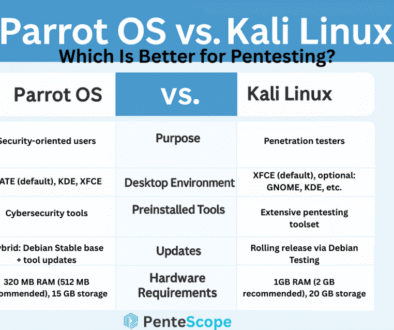Penetration Tester Salary Guide for Cybersecurity Professionals
In the ever-evolving cybersecurity landscape, penetration testing has emerged as a critical skill in safeguarding organizations against sophisticated threats. Beyond the technical prowess required, the profession offers compelling financial rewards, making it an attractive career path. Understanding the penetration tester salary landscape is crucial for both aspiring and experienced professionals aiming to navigate the field effectively.
This article examines the market rates for penetration testers, providing insights into entry-level, mid-career, and senior-level earnings. With cybersecurity demand at an all-time high, professionals can expect competitive compensation, particularly in specialized sectors like finance, healthcare, and government. Key factors influencing salaries include certifications, technical skills, and geographic location.
Whether you’re new to penetration testing or seeking to advance your career, this guide explores earning potential, essential skills for maximizing pay, and career advancement opportunities. We’ll also uncover high-paying industry sectors and strategies to negotiate top-tier compensation. Prepare to gain a comprehensive understanding of how the penetration testing profession rewards expertise and dedication in the dynamic world of cybersecurity.
Current Market Rates for Pen Testers
Entry-Level Salary Ranges
Entry-level penetration testers typically earn between $60,000 and $85,000 annually. This range varies based on location, with metropolitan areas offering higher compensation packages. Recent graduates with relevant certifications like CompTIA Security+ or CEH may command salaries at the upper end of this range.
Mid-Career Earnings
Mid-level penetration testers with 3-5 years of experience can expect salaries ranging from $85,000 to $120,000. These professionals often hold advanced certifications such as OSCP or GPEN and demonstrate proven track records in vulnerability assessment and ethical hacking.
Senior-Level Compensation
Senior penetration testers with 7+ years of experience command salaries between $120,000 and $160,000+. Those in leadership positions or with specialized expertise in areas like cloud security or IoT can earn upwards of $180,000 annually. Additional compensation often includes performance bonuses and profit sharing.
Freelance vs. Full-time Rates
Freelance penetration testers typically charge $100-300 per hour, depending on expertise and project scope. While this appears higher than full-time rates, freelancers must account for business expenses, insurance, and irregular work schedules. Full-time positions offer more stability and benefits, including health insurance and retirement plans.
Factors Affecting Penetration Tester Salaries
Geographic Location
Compensation for penetration testing professionals varies significantly based on location. Major tech hubs like San Francisco, New York, and London typically offer higher salaries due to increased cost of living and concentrated demand for cybersecurity talent. Remote work opportunities have begun to normalize salaries across regions, though location-based pay differences persist.
Industry Certifications
Professional certifications substantially impact earning potential. Key certifications like OSCP, CEH, and CISSP can increase salary by 15-25%. Advanced certifications like OSCE or GPEN demonstrate specialized expertise and command premium compensation packages.
Years of Experience
Experience level directly correlates with salary progression. Entry-level penetration testers typically start at junior positions, while professionals with 5+ years of experience command significantly higher salaries. Senior penetration testers with 10+ years of experience often earn top-tier compensation.
Technical Skill Set
Expertise in specific tools and technologies influences salary potential. Proficiency in programming languages, network protocols, and specialized penetration testing tools enhances market value. Advanced skills in cloud security, mobile application testing, and IoT security testing typically command higher compensation.
Company Size and Type
Organization type significantly affects salary structures. Large enterprises and specialized cybersecurity firms generally offer higher base salaries compared to smaller companies. Consulting firms often provide additional benefits like performance bonuses and profit sharing. Government sector positions typically offer stable, though moderately lower, compensation packages.
High-Paying Industry Sectors
Financial Services
Financial institutions consistently offer premium compensation for penetration testers due to the critical nature of financial data protection. Banks, investment firms, and insurance companies typically offer salaries ranging from $110,000 to $160,000 annually. These organizations require sophisticated security testing to protect against financial fraud and maintain regulatory compliance with PCI DSS and SOX standards.
Government Contractors
Defense contractors and government-affiliated organizations represent another lucrative sector, offering penetration testing salaries between $95,000 and $150,000. These positions often require security clearances and specialized knowledge of government security frameworks like NIST and FISMA. The sensitive nature of government systems and national security implications justify the higher compensation rates.
Healthcare Organizations
Healthcare institutions have emerged as major employers of penetration testers, with salaries ranging from $90,000 to $140,000. The healthcare sector’s strict HIPAA compliance requirements and the increasing digitization of medical records drive the demand for security professionals. Medical device security testing and protecting patient data systems require specialized expertise, commanding premium compensation.
These sectors particularly value penetration testers with industry-specific compliance knowledge and experience with sector-specific systems. The complexity of these environments and the potential cost of security breaches justify the higher salary ranges. Essential skills for maximizing earning potential in these sectors include advanced network security testing, compliance framework expertise, and specialized system knowledge.
Essential Skills for Higher Earnings
Required Technical Competencies
Professional penetration testers must maintain expertise in multiple technical domains. Core competencies include proficiency in networking protocols, operating systems (particularly Linux and Windows), and scripting languages such as Python and Bash. Advanced knowledge of web application security testing frameworks, vulnerability assessment tools, and exploitation techniques is essential. Network packet analysis, wireless security testing, and mobile application security skills are increasingly valuable in today’s market.
Most Valuable Certifications
Industry-recognized certifications significantly impact earning potential. The Offensive Security Certified Professional (OSCP) certification stands as a gold standard, often commanding premium compensation. Additional high-value certifications include CompTIA PenTest+, Certified Ethical Hacker (CEH), and GIAC Penetration Tester (GPEN). Advanced certifications like OSEP (Offensive Security Experienced Penetration Tester) and CREST certifications can further elevate salary prospects.
Soft Skills That Command Premium Pay
Beyond technical expertise, superior communication skills are crucial for maximizing earning potential. Clearly articulating complex technical findings to non-technical stakeholders is highly valued. Project management capabilities contribute to higher compensation, particularly in managing complex security assessments. Critical thinking, problem-solving abilities, and attention to detail are essential soft skills that employers reward generously. Professional report writing skills and the ability to present findings effectively to executive teams also command premium rates.
Security professionals who demonstrate strong business acumen and understand how security impacts organizational objectives often secure higher compensation packages. Let’s explore the various career advancement opportunities available to penetration testers.

Career Advancement Opportunities
Specialization Paths
Security professionals can advance their careers by specializing in specific areas of penetration testing. This includes becoming an expert in web application security, mobile security testing, IoT security assessment, or cloud infrastructure testing. These specialized roles typically command higher salaries due to their focused expertise and increasing market demand.
Management Roles
As penetration testers gain experience, they can progress into leadership positions such as Security Team Lead or Information Security Manager. These roles involve overseeing security testing operations, managing teams, and developing security strategies. Management positions often offer substantial salary increases and additional benefits.
Consulting Positions
Independent consulting presents a lucrative career path for experienced penetration testers. Security consultants can work with multiple clients, set their own rates, and build their reputation in the industry. Many successful consultants establish their own security firms or partner with established consulting companies, potentially earning significantly higher income than traditional employment.
Training and Research Roles
Advanced penetration testers can transition into training positions, developing and delivering security courses, or conducting security research. These roles often involve discovering new vulnerabilities, developing testing methodologies, and contributing to the security community. Research positions at organizations or academic institutions offer both intellectual satisfaction and competitive compensation.
The cybersecurity field continues to evolve, creating new opportunities for career growth. The next section explores effective strategies for negotiating competitive compensation packages in these various career paths.
Salary Negotiation Strategies
Market Research Methods
Effective salary negotiation begins with comprehensive market research. Industry salary surveys, professional networks like LinkedIn, and specialized job boards provide valuable benchmark data. Consulting salary comparison websites such as Glassdoor, PayScale, and Salary.com helps establish realistic salary ranges for penetration testing positions across different regions and experience levels.
Proving Your Value
Quantifying achievements and documenting successful penetration tests creates a compelling case for higher compensation. Professional certifications (OSCP, CEH, CISSP), specialized skills in emerging technologies, and demonstrated experience with advanced testing tools significantly strengthen negotiating positions. Creating a portfolio of resolved vulnerabilities with metrics on potential cost savings for employers provides tangible evidence of value contribution.
Timing Your Ask
Strategic timing is crucial for successful salary negotiations. The ideal moments include annual performance reviews after completing major security projects or when taking on additional responsibilities. Document recent accomplishments, industry certifications obtained, and expanded skill sets before initiating compensation discussions.
Staying informed about the organization’s fiscal planning cycle and security budget allocation periods can provide additional leverage during negotiations. Security breaches at competitor organizations or new compliance requirements often create opportunities to highlight the value of experienced penetration testers.
Industry demands for cybersecurity professionals continue to evolve, making it essential to understand career advancement opportunities and their corresponding compensation packages.
Conclusion
The cybersecurity industry continues to offer lucrative opportunities for penetration testers, with salaries varying significantly based on expertise, location, and industry sector. Professional certifications, technical skills, and practical experience are crucial in commanding higher compensation packages. Financial services, healthcare, and technology sectors consistently offer the most competitive salaries for skilled penetration testing professionals.
To maximize earning potential in this field, cybersecurity professionals should focus on continuous skill development, pursue relevant certifications, and stay current with emerging threats and technologies. Building a strong professional network, documenting achievements, and developing effective salary negotiation strategies are essential steps toward achieving career growth and securing optimal compensation in the dynamic field of penetration testing.
Call to Action
We invite you to share your thoughts and experiences in the comments section. Your insights and feedback are valuable in fostering a collaborative discussion on enhancing security measures. By engaging, you agree to our Privacy Policy.
Subscribe to our monthly newsletter and follow us on our Facebook, X, and Pinterest channels for more insights and updates on cybersecurity trends and best practices. Our blog provides valuable information and resources to help you stay informed and prepared against evolving threats.
Engage with our community to share knowledge, ask questions, and stay connected with industry developments. Visit our About Us page to learn more about who we are and what we do. Furthermore, please reach out through our contact page if you have any questions. You can also explore our services to discover how we can help enhance your security posture.
Frequently Asked Questions
A penetration tester, or ethical hacker, simulates cyberattacks on systems, networks, or applications to identify vulnerabilities. Their goal is to help organizations strengthen their security defenses.
Entry-level penetration testers earn between $60,000 and $85,000 annually. Mid-level professionals can expect $85,000 to $120,000, while senior-level testers often command $120,000 to $160,000 or more.
Certifications like OSCP (Offensive Security Certified Professional), CEH (Certified Ethical Hacker), and GPEN (GIAC Penetration Tester) are highly valued and can increase earning potential by up to 25%.
Freelance penetration testers can charge $100 to $300 per hour, offering potentially higher earnings than full-time roles. However, freelancers must independently manage irregular work schedules, business expenses, and benefits.
Financial services, government contractors, and healthcare sectors offer some of the highest salaries for penetration testers, ranging from $95,000 to $160,000 or more, depending on experience and specialization.




